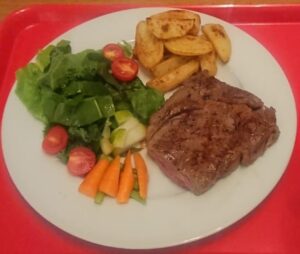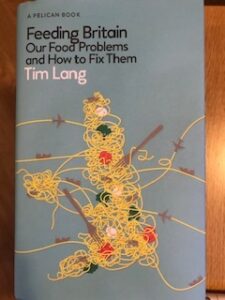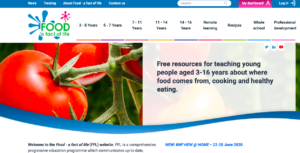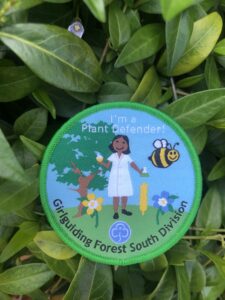Food. We all like it, we all need it and most of us take its availability for granted.  In lockdown we have had a taster of not being able to shop for food when we want to or the expectation that we can enjoy a wide selection of cuisines in restaurants. But what if it weren’t simply a question of businesses not being able to trade or deliver foods, but that the supply just wasn’t there? Here is the relevance to plant health. Plant health underpins a secure food supply whether for human consumption or animal feed and is my topic for this month’s blog.
In lockdown we have had a taster of not being able to shop for food when we want to or the expectation that we can enjoy a wide selection of cuisines in restaurants. But what if it weren’t simply a question of businesses not being able to trade or deliver foods, but that the supply just wasn’t there? Here is the relevance to plant health. Plant health underpins a secure food supply whether for human consumption or animal feed and is my topic for this month’s blog.
I don’t mean to scaremonger; that would induce an unhelpful panic response of limited scope, but to introduce a few thoughts to show the complexity of the situation and encourage more to appreciate the role that plant health plays in food security. This relates directly to the IYPH2020 key message 3 “Keep plants healthy while protecting the environment” http://www.fao.org/plant-health-2020/about/en/
Professor Ian Toth, Director of the Scottish Centre of Expertise for Plant Health gave a talk entitled “Reducing the burden of plant pests and diseases” to the Gatsby Plant Science Summer School undergraduates in July 2019 and this talk is accessible for the general reader. https://www.youtube.com/watch?v=S0Ocs3gUT7k Key statistics, amongst many others, are that the UK produces only about 50% of the food we need and that 30% of that comes from the EU. One year later, we do not yet know how trade with the EU will work post-Brexit. Of course the UK already trades with other world countries and the assumption is that these deals will develop but these details are not yet known.
A recent book I recommend highly is “Feeding Britain; our food problems and how to fix them” by Professor Tim Lang, Professor of Food Policy at City University of London.  It shows the complexity of food policy; encompassing politics, economics, health, social science, geography as well as food science and agriculture. One thought I found particularly powerful was that the UK’s history tends to give us confidence that “someone will feed us” and that we must now challenge this and consider how we can be more food secure independently. The book was signed off in January 2020, before the Covid pandemic.
It shows the complexity of food policy; encompassing politics, economics, health, social science, geography as well as food science and agriculture. One thought I found particularly powerful was that the UK’s history tends to give us confidence that “someone will feed us” and that we must now challenge this and consider how we can be more food secure independently. The book was signed off in January 2020, before the Covid pandemic.
How will an understanding of plant health help? As Professor Toth explains 30% of crop losses are due to pests and diseases. All of the agriculture sector are working to reduce this and increase crop yields, particularly Agri-tech which is developing broad-ranging technological solutions such as robotic weeding, vertical farming and breeding new varieties that are disease-resistant and capable of withstanding stresses due to climate change. All of these efforts relate to the IYPH2020 key message 4 “Invest in plant health capacity development, research and outreach.
What if you live in a city though? Isn’t agriculture someone else’s responsibility? Largely yes, but an awareness that what we grow in our gardens and outdoor spaces and what we eat is plant-based or reliant on plants means that it is in all our interests to appreciate that keeping plants healthy wherever we live is important. Disease is carried by wind, water and carriers such as insects and people so, a diseased plant in a city could in theory infect a field of crops in the country. Once infected, crops rarely recover fully and will lead to crop and economic loss.
What can we do? I am bound to say education is the answer of course, but it really is. I don’t mean studying plant health to degree level, though I would hope some would take this route. I mean all of us engaging in conversations with friends and family that we cannot take food supply for granted. We can all make choices that help to make a difference and spread awareness that keeping plants healthy and disease under control will protect our food supply.
Here are a few ideas to engage children especially; meal-times while home-schooling might be opportunities for these conversations and the  Agriculture and Horticulture Development Board have produced activity sheets, posters and videos to help https://ahdb.org.uk/coronavirus-home-schooling-resources-for-parents.
Agriculture and Horticulture Development Board have produced activity sheets, posters and videos to help https://ahdb.org.uk/coronavirus-home-schooling-resources-for-parents.
One plant science student has just started a plant defender girl-guiding badge  through the British Society for Plant Pathology https://www.bspp.org.uk They had such a phenomenal take-up that they ran out of badges in 20 minutes!
through the British Society for Plant Pathology https://www.bspp.org.uk They had such a phenomenal take-up that they ran out of badges in 20 minutes!
For the older young person, or anyone with time on their hands, if you have farm land nearby needing fruit or vegetable pickers, this temporary opportunity could stop food going to waste, feed someone in need and who knows, it might open up new opportunities too https://pickforbritain.org.uk
To finish on a personal note, last year I ran a Grow your own chips competition with my family and wrote a blog about how and why I did this https://celiaknightconsulting.co.uk/2019/09/ This year my family started their vegetable growing without any prompts – how pleased am I!
You can also find more information on this government website https://www.yearofplanthealth.co.uk/iyph-2020
